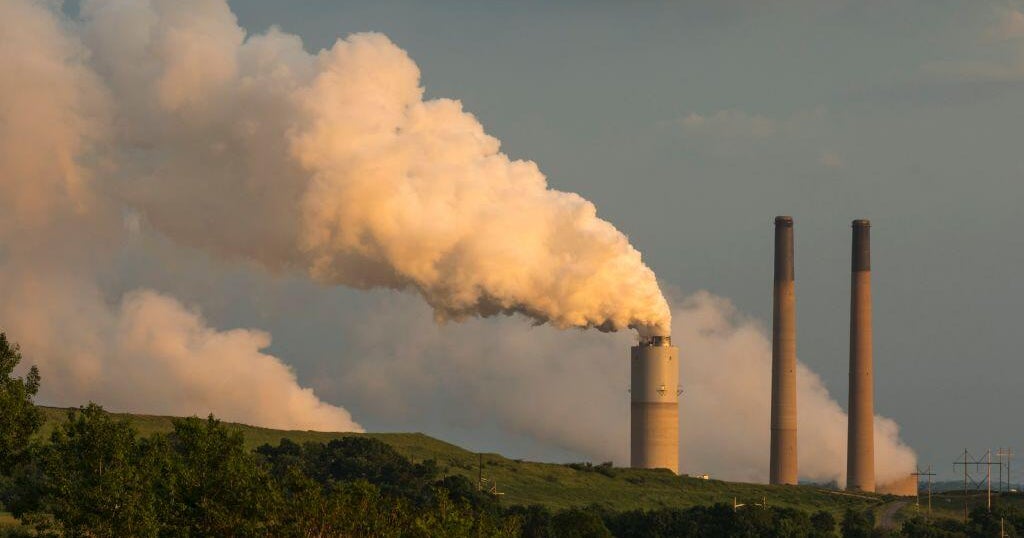
The Environmental Protection Agency announced Wednesday that it will seek to revoke a key rule put in place by the Biden administration that set limits on the amount of carbon dioxide, a major greenhouse gas that contributes to climate change, emitted from fossil fuel-fired power plants.
The rule was finalized in April 2024 and is projected to reduce 1.38 billion metric tons of carbon dioxide from entering the atmosphere by 2047, as well as eliminate tens of thousands of tons of other harmful air pollutants that are dangerous to public health. Eliminating 1.38 billion metric tons of carbon emissions is equivalent to driving more than 320 million gas-powered cars for a year, according to an EPA estimate.
At a news conference Wednesday, EPA Administrator Lee Zeldin said the Trump administration is demonstrating that it “can both protect the environment and grow the economy.”
“Today is a historic day at the EPA,” he said. “For the last few months, since President Trump was sworn in for this term, we here at the EPA have been taking actions to end the agency’s war on so much of our U.S. domestic energy supply.”
Zeldin argued that the Biden-era rules were attempting to “suffocate our economy in order to protect the environment.”
EPA data shows that in 2023, the power sector produced 31% of carbon emissions from burning fossil fuels, the second-highest of all industries.

Former Obama EPA Administrator Gina McCarthy, disagreed with Zeldin, saying in a statement, “The key rationale Zeldin is using to justify the dismantling of our nation’s protections from power plant pollution is absolutely illogical and indefensible. It’s purely a political play that goes against decades of science and policy review.”
Zeldin also announced that the agency will move to repeal updated limits to the Mercury and Air Toxic Standards rule, which restricts the amount of pollutants that can be emitted by coal and natural gas-fired power plants. The rule was first introduced in 2011, but the Biden administration tightened the regulations in 2024 to ensure that fossil fuel plants reduce emissions from toxic metals by 67% and from mercury by 70%.
Now, the EPA plans to loosen those more stringent standards, which Zeldin said are “gratuitous.” Zeldin said that if the rule is finalized, power plants will not be allowed to emit more than they do today or as much as they did during the Biden administration.
Although mercury is naturally occurring in nature, exposure to high levels of it in the air, water and food supply is toxic to human health and especially dangerous to the development of young children and fetuses, according to the World Health Organization. When mercury is released into the air, it can travel great distances and land in lakes and rivers, where it is exposed to fish that can be eaten by humans.
The rule has been highly effective, reducing mercury air emissions from power plants by 85% from 2013-2022. It’s worth noting that a big part of that shift was driven by a decline in coal plants and by installing pollution controls on fossil fuel-based power generation.
If the EPA finalizes the two proposals, they likely will face legal challenges.
Zeldin was joined by several Republican members of the House and Senate, including Sen. Kevin Cramer of North Dakota, who applauded the announcement as a “common-sense” change.
“What’s been done up to this point is literally a unilateral disarmament of the American economy,” he said.
The rollbacks support President Trump’s executive order, “Unleashing American Energy,” and its mission to review policies that might “impose an undue burden on … domestic energy resources.”
But critics of the announcement, including many environmentalists, say the economic and health benefits of the Biden-era rules outweigh the cost of compliance and the rollbacks could be dangerous.
“The EPA is hoisting the white flag of surrender on the power plant pollution that’s poisoning the air we breathe and harming our climate,” said Manish Bapna in a statement, president and CEO of the Natural Resources Defense Council. “What’s more, EPA is trying to repeal toxic air pollution standards for the nation’s dirtiest coal plants, allowing the worst actors to keep poisoning the air.”
The Environmental Protection Network, a group of hundreds of former EPA employees, did an analysis of EPA data to estimate the health and economic impact of both rules. It found that the Biden-era power plant pollution and mercury rules, combined, could avoid the premature mortality of more than 15,000 people and prevent more than 5.1 million symptomatic asthma incidents, cumulatively through 2050. The two rules are estimated to provide more than $2.24 billion in annual net benefits for public health and the economy by reducing hospital and health care costs.
Zeldin claimed that the new proposed Trump-era rules are expected to save more than $1 billion per year.
Some environmental groups say they are prepared to sue the EPA over the rollbacks.
“If EPA proceeds with repealing these life-saving standards based on a legal theory that doesn’t pass the laugh test, our lawyers are ready to defend the public’s right to breathe in court,” Meredith Hankins, a senior attorney at the Natural Resources Defense Council, said in a statement.